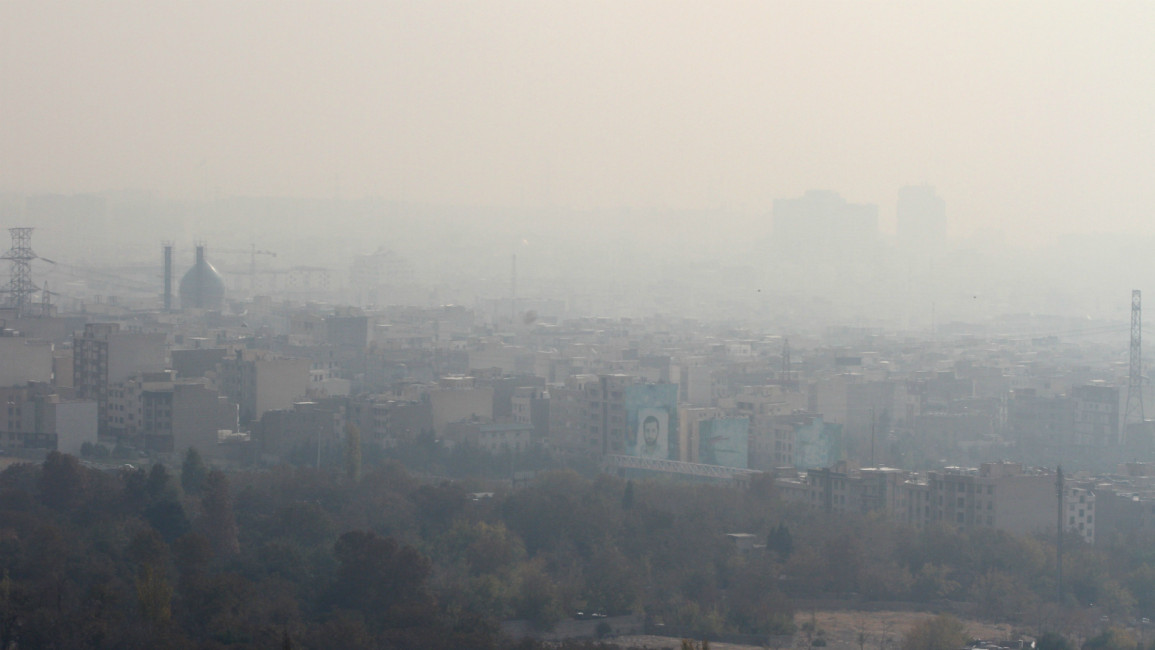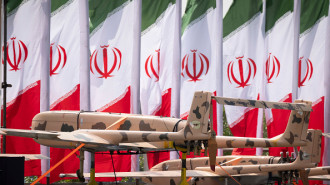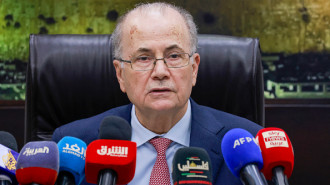Thick smog closes schools in Iran's polluted capital
Thick smog closes schools in Iran's polluted capital
Pollution has forced schools and nurseries in Iran's capital to shut again, as a dense cloud of brown smog engulfs Tehran provoking health fears.
2 min read
Smog in Iran frequently occurs in winter [Getty]
Tehran officials shut schools on Monday as the first of the winter's heavy pollution hit the Iranian capital.
A blanket of choking brown-white smog descended on the city on Sunday, blocking the views of surrounding mountains that line Tehran's northern edge and leading many of its 14 million residents to retreat indoors or don face masks in the street.
The level of the deadliest PM2.5 particles hit 156 on Monday - more than three times the level considered safe by the World Health Organisation.
"Kindergartens and primary schools are closed on Monday in Tehran and most of the cities of the province," the ministry of education announced.
Officials extended traffic restrictions that alternate cars with odd and even licence plates in two central parts of the city, and deployed ambulances to wait in the busiest and dirtiest areas.
Tehran Mayor Mohammad Bagher Ghalibaf rode the metro to work on Sunday in a bid to encourage people to use public transport.
Despite having around 100 stations, Ghalibaf said the metro is not sufficiently funded by the central government, and Tehran has some of the world's worst traffic congestion.
Pollution has become a political football in recent years, with conservatives and reformists blaming each other for the problem.
Hardliners regularly accuse the reformist Vice-president Massoumeh Ebtekar, who heads the environmental protection organisation, of not doing enough.
The ultra-conservative daily Vatane Emrooz said Monday that 70 percent of deaths in Tehran were linked to pollution.
The pollution has been building for six consecutive days and is expected to continue until Wednesday when forecasters hope winds will move the stagnant air, an official told state television.
Residents were advised to stay indoors unless absolutely necessary, with warnings that pollution is particularly dangerous for the elderly, pregnant, children and those with existing respiratory and heart conditions.
Sand and cement factories around Tehran were also shuttered.
Every year, Tehran suffers some of the worst pollution in the world when cold weather traps the vast levels of exhaust from the city's 10 million ageing cars and motorbikes.
Two permanent zones of traffic restrictions introduced in 1979 and 2005 have failed to rectify the sprawling city's poor air quality.
Local car-makers have shown little interest in introducing cleaner engines, while foreign firms have been kept out by international sanctions.
In 2014, almost 400 people were hospitalised with heart and respiratory problems caused by heavy pollution in Tehran, with nearly 1,500 others requiring treatment.
The health ministry estimated that pollution contributed to the premature deaths of 4,500 people in Tehran in 2012 and about 80,000 across the country.
A blanket of choking brown-white smog descended on the city on Sunday, blocking the views of surrounding mountains that line Tehran's northern edge and leading many of its 14 million residents to retreat indoors or don face masks in the street.
The level of the deadliest PM2.5 particles hit 156 on Monday - more than three times the level considered safe by the World Health Organisation.
"Kindergartens and primary schools are closed on Monday in Tehran and most of the cities of the province," the ministry of education announced.
Officials extended traffic restrictions that alternate cars with odd and even licence plates in two central parts of the city, and deployed ambulances to wait in the busiest and dirtiest areas.
Tehran Mayor Mohammad Bagher Ghalibaf rode the metro to work on Sunday in a bid to encourage people to use public transport.
Despite having around 100 stations, Ghalibaf said the metro is not sufficiently funded by the central government, and Tehran has some of the world's worst traffic congestion.
Pollution has become a political football in recent years, with conservatives and reformists blaming each other for the problem.
Hardliners regularly accuse the reformist Vice-president Massoumeh Ebtekar, who heads the environmental protection organisation, of not doing enough.
The ultra-conservative daily Vatane Emrooz said Monday that 70 percent of deaths in Tehran were linked to pollution.
The pollution has been building for six consecutive days and is expected to continue until Wednesday when forecasters hope winds will move the stagnant air, an official told state television.
Residents were advised to stay indoors unless absolutely necessary, with warnings that pollution is particularly dangerous for the elderly, pregnant, children and those with existing respiratory and heart conditions.
Sand and cement factories around Tehran were also shuttered.
Every year, Tehran suffers some of the worst pollution in the world when cold weather traps the vast levels of exhaust from the city's 10 million ageing cars and motorbikes.
Two permanent zones of traffic restrictions introduced in 1979 and 2005 have failed to rectify the sprawling city's poor air quality.
Local car-makers have shown little interest in introducing cleaner engines, while foreign firms have been kept out by international sanctions.
In 2014, almost 400 people were hospitalised with heart and respiratory problems caused by heavy pollution in Tehran, with nearly 1,500 others requiring treatment.
The health ministry estimated that pollution contributed to the premature deaths of 4,500 people in Tehran in 2012 and about 80,000 across the country.



